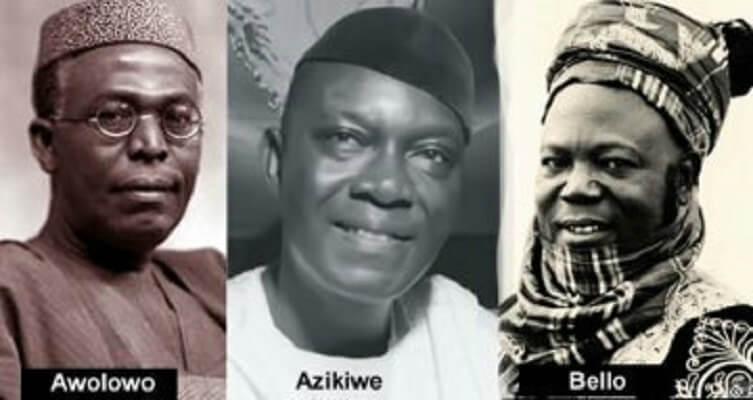FLASHBACK! How Awolowo, Azikiwe, Sardauna ‘Clashed’ During Pre-Independence Trip To Britain
A look at Nigeria’s pre-independence movement has revealed that disagreements being experienced between the different geopolitical regions of the country today, preceded Nigeria’s independence.
An article published 62 years ago has revealed how the then heads of government of the northern, eastern and western regions of Nigeria “clashed” during a trip to Britain where they had gone to formalise the process for the British colonial masters to grant independence to Nigeria.
Advertisement
Dr Nnamdi Azikiwe, the premier of the Eastern region; Chief Obafemi Awolowo, premier of the Western region; and Sir Ahmadu Bello (Sardauna of Sokoto), who was the North’s premier, hurled “insults and accusations” at each other at the Lancaster House where they were hosted, a Time Magazine editorial of November 10, 1958, has revealed.
The report said the three premiers, at a conference organized by the colonial masters, “shot insults back and forth like poisoned darts” over disagreements they had about the creation of states and centralized police force, amongst others.
The editorial partly reads: “In Western eyes, Obafemi Awolowo of the Western Region seemed the most statesmanlike: as the conference began, the London Times carried a full-page ad proclaiming his declaration for freedom under the title “This I Believe,” prepared with the help of an American public relations man.
“In contrast, U.S.-educated Premier Nnamdi (“Zik”) Azikiwe of the Eastern Region seemed to have learned more in the U.S. about Tammany tactics than Thomas Jefferson, and was somewhat under a cloud as a result of a British tribunal’s 1956 investigation into corruption in his administration.
Advertisement
“The North’s Premier, the Sardauna of Sokoto, a haughty Moslem of noble birth, could barely conceal his contempt for his less aristocratic colleagues.”
Although the three premiers eventually reached agreement on the issues, they were said to have “bickered”, with the Sardauna initially opposing the protection of the rights of minorities and creation of centralized police and new states.
“Under the great chandeliers of the Lancaster House music room, where Chopin once played for Queen Victoria, the Premiers bickered, shot insults back and forth like poisoned darts.
“When the conference took up the ticklish problem of how to protect the rights of minorities among Nigeria’s 250 tribes, Awolowo suggested creating three new states. The North’s Sardauna, not wishing to relinquish any of his own territory, vetoed the idea. Nor did he like the plan for a centralized police force under the federal government: he much preferred to use his own force, which, answerable only to him, can pop a man in jail with no questions asked.
“At one point, the Sardauna accused Awolowo of sending his supporters to Israel to be trained as saboteurs in the North —a charge fabricated out of the fact that Western Nigeria has imported agricultural experts from Israel to advise its farmers. Awolowo countercharged that the Sardauna flogs his prisoners.
Advertisement
“At receptions the delegates sipped their orange juice, icily aloof from one another. In elevators conversation would suddenly stop if a delegate from another region got on.”
The report added that, “But as the weeks passed, the Sardauna grudgingly consented to let the constitution carry a bill of rights, though he was so thoroughly opposed to giving the vote to women that the conference decided that this was, after all, not necessarily a “fundamental” right.
“The delegates then agreed on a centralized police force, but one that would be administered by a council of representatives from each region. Finally, with their own independence from Britain assured (as well as that of the adjacent British Cameroons, should they choose to become a part of Nigeria), the delegates started for home.
“Until Nigeria’s federal election takes place next year, the three Premiers will continue jockeying for power, and the fate of Nigeria could well hinge on who comes out on top. Last week, even as the National Planning Committee of Independence opened its contest for the design of a national flag (first prize: $300), many Nigerians had grave reservations about what lay ahead.
“For all its jubilation, Nigeria’s West African Pilot felt obliged to warn: “Independence without difficulties is a dream of Utopia.””



